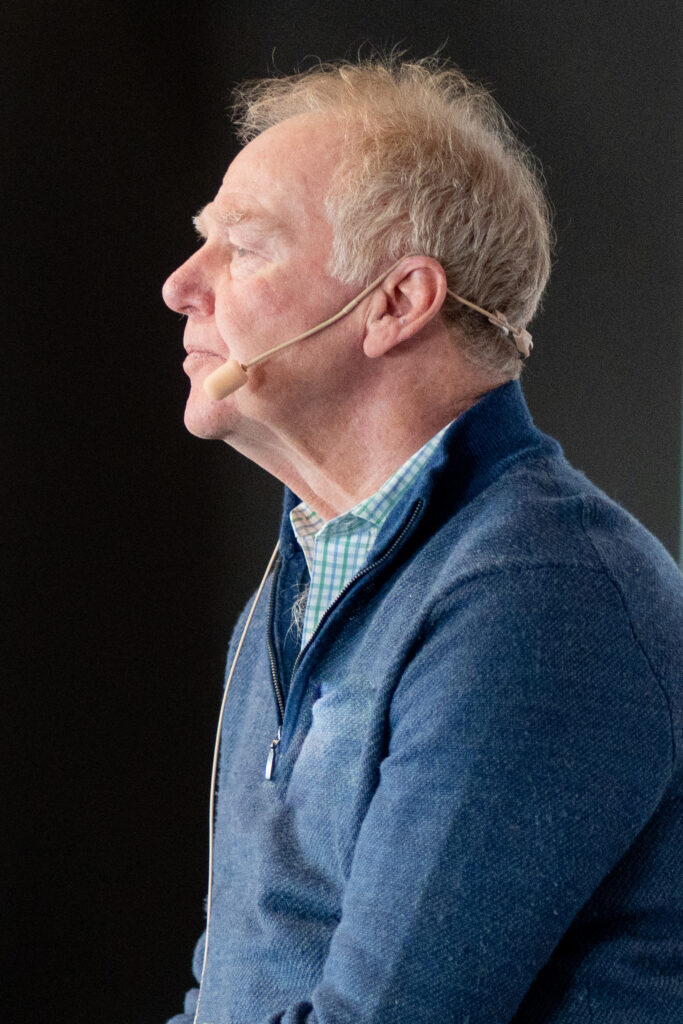We had the privilege of getting a short chat with the number one system thinker in the world, Peter Senge. Sorry for the background noise. If you want to hear more of him, please join the Leading Complexity program.
Hello Peter. For those that don’t know you, who are you?
Seems like a simple question but maybe not as simple as it seems. I’m an American who comes to Sweden once in a while. Probably 10 years since I have been here. I’ve been at MIT for a long time and have been involved in all kinds of understanding interdependencies, complexity, and system thinking. What we today call System awareness. There has been a thread about how people can operate in organizations, schools, and society. How we can operate where we are more effective with the extraordinary interdependencies of the world.
What is complexity for you?
The technical definition of complexity and system science is a situation where causality is not simple. In the phraseology in the MIT tradition definition I grow up in, complexity is when the effect is not close in time or space. When a billiard ball is hitting another billiard ball the causality is close in time and space. A complex system is exactly the opposite. Then causality is neither close in time nor space. Raising kids is inherently complex because the things we do today have an impact maybe 20 years from now. For a teacher, it is the same thing. It’s not just about that person (my kid or that student). It’s about the life they live and there could be impacts through them radiating out into their lives and all the people they touch. You realize that complexity is not new – Living is complex.
What is your advice how to lead in complexity
First off: our national impediment, we think we need to understand. Most people in leading positions were successful at school. They have been pretty successful, maybe in jobs that have been simpler and they carry with them the expectation that in order to be successful I must understand what is going on. But, if you take in what I said about cause and effect is not close in time or space, you never understand. Letting go of the belief that I should understand – you try to understand – you do your best – but you must let yourself have a break. Because there are no rules for raising your kids. You can do everything right but it will turn out poorly. Or you can make a lot of ridiculous mistakes, which most of us do, and it all turns out okay. That’s the nature of complex systems. It’s not, when you push this button, this happens. So the implication is that you don’t know. And it’s not about that you’re not smart enough. It’s because it’s not knowable. When people really get that, they relax a little. It doesn’t mean you’re not spending a lifetime trying to understand. But the effort to understand, will not produce complete knowing. That said, often in circumstances, because of your position and authority, people expect you, not because you think that you should, they think you should know. It’s a very conflictual world.
One of the things I’ve always been interested in is how different people deal with that conflict. In other words: “Yes, I know I can be my own worst enemy by thinking I need to figure it out”. But I’m surrounded by people who think I’m paid to figure it out. And by the way, there are people paying me to figure it all out. I got this surrounding social circumstance that I need to manage. I have to figure out how to navigate that.
I have a very good friend who became CEO of a very big company and he has been there for 40 years or so. He came in during extremely difficult times. There was a big collapse and it was not his fault. Everybody around him, including the board and 10th of thousands of people, expected him to solve the problem. First speech he gave he said that it’s been a very challenging time and we have all lived through it. There has been a lot of pain so acknowledge the pain. It’s very important for leaders to be empathetic. And then he said, “We don’t have the answer”. He wasn’t sure he could say it but that was the truth and people deserve honesty. It was the most effective speech he had held. In the next two weeks, he got so many ideas from so many people. They realized that he didn’t tell them what to do and that they needed to figure this out together. It invited so many people to take more responsibility. It’s not like the answer is to always tell people you don’t have the answer. But in that moment, that was what was needed. People are really good at complexity, sensing: “How can I contribute best right here? What’s the moment really needing from me? ” Let go of the illusion that I should understand it all and figure it all out. Be honest.
Thank you




